#next post: pt 1 of my kim bennett manifesto
Explore tagged Tumblr posts
Text
Lewisohn vs. Wenner Pt. 2 of 2
Part 1 // More Tune In analysis
You probably know the drill by now: I'm looking at the quotes from Tune In against the source Mark Lewisohn gives for them, and seeing if they're faithfully reproduced. This post deals with the multi-source Frankenquotes that are partly attributed to Jann Wenner's interviews. Five of the quotes here are from the infamous Lennon Remembers interview, with a sixth from a separate interview for Rolling Stone. Lewisohn combines John's words from these interviews with a myriad of other sources: a televised interview of John by Jean-François Vallée (1975), Hunter Davies’ The Beatles (1968), an interview/cohosting spot on The Mike Douglas Show (1972), and an interview with Lisa Robinson for Hit Parader (1975).
Before I get into it, I wanted to take a moment to discuss how I ‘grade’ Lewisohn’s quotes based on the type of source he cites. If Lewisohn is using a recorded interview, there’s some wiggle room in things like punctuation and word stress. When transcribing the same interview, two people might listen to the same phrase and come away with slightly different versions, e.g. “My favorite color was blue, but that changed after the accident in the paint factory,” vs. “My favorite color was blue. But that changed after the accident in the paint factory.” Both of those could be correct interpretations of the same recorded audio, so I can’t fault Lewisohn for changes along those lines when he’s working from an audio source.
There isn’t the same wiggle room when working from text. If I pull a quote from a book, and the book reads, “Now, I love green. It’s so lush,” I can’t change that to, “Now I love green; it’s so lush.” I’m not actually quoting the person who said those words originally—I’m quoting the transcribed and published version of what that person said.
I've taken this into account with these Frankenquotes. If there are punctuation differences between Tune In and the printed version of Lennon Remembers pictured here, I haven’t made note of them. Those same differences in a quote pulled from Davies’ The Beatles will be noted, since Lewisohn is quoting the printed source and not an original audio tape. This becomes a bit confusing when a single “quote” is compiled from different sources, and the bits from one source are graded on a different rubric than the other, but such is the thrill of fact-checking Mark Lewisohn!
Citations at the end. Time stamps refer to this upload of the Lennon Remembers interview.
Tune In 4-12 vs. Wenner p.76 (2:14:41), 18 (36:24) + Vallée Interview
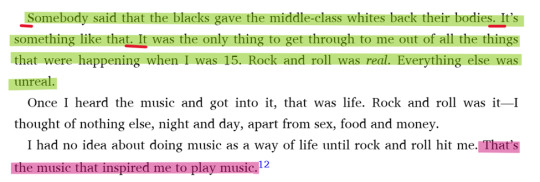


I haven't been able to track down the source for the middle section of this Frankenquote (it’s from an interview by Jean-François Vallée for the French TV Series Un jour futur, in the episode “Il était une fois: John Lennon.”), nor did I find the first sentence of the third part of the quote. It isn’t in the printed version of Lennon Remembers, and it doesn’t appear before the final sentence in the audio, though perhaps it’s elsewhere on the tape.
This has several classic Lewisohn offenses: stitching together multiple sources, combining distinct sections of a single source into one quote, and phrases omitted without ellipses. I've noted these on the images above.
What I'd like to bang on about is Lewisohn's choice not to clarify who John is referencing at the start of the quote--the "somebody" discussing black music and white bodies. In the original interview, John credits it to either "Michael X or Eldridge Cleaver" (Lennon Remembers gives this as Malcolm X, but it's clearly Michael X on the tape--see end of post for some background on Michael X and Lennon). It's common practice by many authors to clarify ambiguous references like this; Mark Lewisohn even does it in Tune In. He mostly does this in the endnotes (e.g. P-4, 2-22), but he uses a footnote to clarify a song lyric he himself uses in the prose of Chapter 4 (see footnote 4-c). Lewisohn not only fails to clarify who John is referencing here, he does not quote John's attempted attribution.
But maybe this falls under Lewisohn's inconsistent policy of not referencing the future. Still, even without naming the black activist who John references here, this quote is not a reflection of John's mindset in his adolescence: he wasn't sitting at a Quarry Bank chum's house in 1956, thinking "gee, thank goodness this black music has reconnected me with my middle-class white body!" The use of the above quote is foresight in and of itself, so why not credit the person who originated that line of thinking? Are Lewisohn's footnotes only for pronunciation guides and details of how demonstrably effeminate certain Beatles' relations were? For someone proclaiming their book a "social history", it's a bit of an oversight.
It's Eldridge Cleaver, by the way, in his prison memoir Soul on Ice (1968). It's in the chapter titled "Convalescence," in a discussion about the Beatles and white rock 'n' roll. Be forewarned if you seek it out, that section is also heavily homophobic.
Tune In 6-7 vs. Wenner p.133 (3:53:54) + Davies p.33



Hunter Davies did not record his interviews with the Beatles, as described in the introduction to the 2009 edition (p.lxiii): “I also wish now that I’d used a tape recorder. I never have done, which is silly.” Since we know Lewisohn was working with Davies’ written word, he was not at liberty to make changes like the one we see here: Davies starts a new sentence at the word “But”, which Lewisohn combines with the preceding sentence. There are changes like this throughout the quotes pulled from Davies’ work, but that’s a matter for a later post.
The other change Lewisohn makes here is more consequential. When discussing how Paul came to join the Quarrymen, John says, “That decision was to let Paul in.” Lewisohn gives the quote as “[my] decision was to let Paul in.”
Perhaps you’re thinking, “He’s used brackets! It’s fine!”, but I disagree. Brackets can be used when changing the tense of a quote, or when changing a word to clarify the meaning of a quote, so long as doing so doesn’t change the meaning. Clarification isn’t necessary here: the quote, as stated by Lennon, would make sense in the context Lewisohn provides. There’s no confusion about what decision John is discussing here.
But this change isn’t simply superfluous—it actually changes the meaning of the quote in a way that’s only clear if we look at the source. Here’s what immediately precedes the quote:
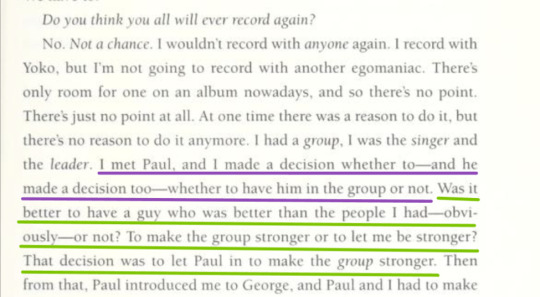
“I met Paul, and I made a decision whether to—and he made a decision too—whether to have him in the group or not.” Emphasis mine.
So John is not talking strictly about his decision, he’s talking about Paul and his mutual decision to work together. Without this context, even without the change from “that” to “my”, John seems to be discussing his own decision. Lewisohn’s change is completely unnecessary to get across his point. It’s as if he made this change specifically to push back against John Lennon’s assertion that a young Paul McCartney had autonomy and didn’t simply exist to satisfy John’s whims.
Tune In 8-4 vs. Wenner p.133-4 (3:54:42) + Davies p.44-5
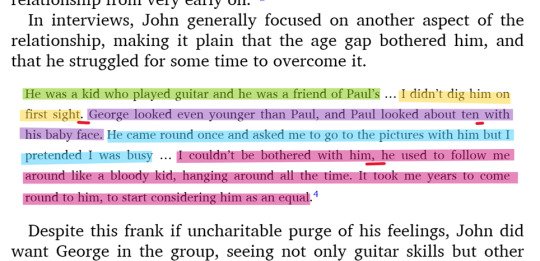

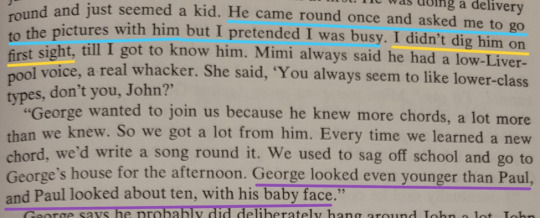
Color-coded to show the absolute chopped salad Lewisohn made of these two sources.
Also of note is Lewisohn’s follow-up to this quote, “Despite this frank if uncharitable purge of his feelings….” Lewisohn does this elsewhere (notably with John’s quote about hitting women): he follows up a self-critical quote from John with an authorial “Aw, don’t be so hard on yourself, buddy!” It’s unnecessary.
Tune In 8-28 vs. Wenner p.140 + The Mike Douglas Show


Lennon: He’s the greatest rock ‘n’ roll poet, and I really admire him. Douglas: Do you feel the same today as you did years ago in Liverpool about rock? Lennon: When I hear rock, good rock, of the caliber of Chuck Berry, I just fall apart and I have no other interest in life. Y’know, the world could be ending if rock ‘n’ roll’s playing, y’know. It’s a disease of mine.
I wasn’t able to find this quote in the interview audio, but I’m sure its there somewhere. I used Lennon Remembers as a guide to find the correct location of a certain segment in the 4+ hour audio, and it is apparent that certain parts of Lennon Remembers have been reordered.
I transcribed this section of the Mike Douglas Show from a video posted on the Shanghai-based streaming app BiliBili - see link in my source list.
Lewisohn uses an ellipsis to indicate a transition between two totally different sources here but does not use an ellipsis to indicate the phrases he left out of the Wenner interview. There are several small changes to the quote from the Mike Douglas show as well, but the meaning is retained.
Tune In 22-78 vs. Robinson 1975 + Wenner p.122 (1:33:20)

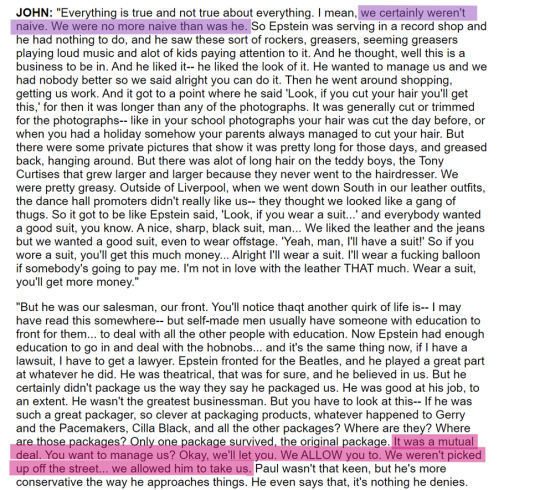

The first source here is Lisa Robinson’s 1975 interview with John for Hit Parader. You can find a version of this interview here. Note the lack of ellipsis between the purple and pink sections, despite the lengthy omission between them.
Lewisohn does use an ellipsis in the Wenner-derived portion of this quote, but he doesn’t place it correctly. The omission occurs between “and” and “Brian”, not between the rest of the quote and “and Brian.”
It wouldn’t make sense to include Allen Klein and Yoko Ono in this quote as it appears in Tune In, since they won’t appear until much later in the series, but I do wonder if presenting the quote without their names truly preserves the quote’s meaning. However you feel about them personally, Allen Klein and Yoko Ono are two of the most controversial figures in Beatles’ history. Within a few years of this interview, John would be on the outs with Allen Klein. John describes himself as someone who “make[s] a lot of mistakes character-wise”, and goes on to list three examples of his good judgments. Two of those are Allen and Yoko. Is it intellectually honest to delete those two names from the list and present Brian as the one example of John’s character judgment?
And our final Wenner Frankenquote. This one isn’t from Lennon Remembers, but from a 1970 Rolling Stone article titled “The Beatles: One Guy Standing There, Shouting ‘I’m Leaving’.”
Tune In 22-72 vs. Wenner 1970 + Robinson 1975



This one is audacious enough to warrant its own post—and we’re in luck! I defer to @mythserene's post for proper analysis. You can also find this one discussed in @anotherkindofmindpod's "Fine Tuning: Ep 7 Spanner in the Works."
In brief, in the ‘quote’ lifted from Wenner’s interview, John is using “Epstein” as a stand-in for Klein. John’s not saying “Three of us chose Epstein”—he’s saying “Three of us chose Klein, throw aside your assumptions about him for a minute.” It’s not the sort of quote you can divorce from its context if you have any credibility.
Some Context on Michael X and John Lennon:
Michael X (a.k.a. Michael Abdul Malik, born Michael de Freitas) was born in Trinidad and became a prominent member of the black Power movement in 1960s London. Lennon met Michael X early in 1970 and became a devoted supporter and advocate until Malik’s death in 1975 (Wiener 1991, p.115-123). Here’s a brief rundown of their involvement:
Since you’re the sort of person who reads citation-by-citation analyses of Beatles books, you have probably seen pictures from early 1970 of John and Yoko sporting matching pixie cuts. In January 1970, John and Yoko shaved their heads (as a publicity stunt, I assume?), and kept their shorn hair in a bag. This bag of hair was the centerpiece for their first public interaction with Michael X: in February 1970, Lennon and Ono gave Malik their bag of hair, and he gave them a pair of Muhammad Ali’s shorts. The press was very much present, but they failed to make headlines (Doggett 118). The hair was supposed to be auctioned off at Sotheby’s to support Malik’s Black House, but this fell through (see Lennon on The Dick Cavett show here.) Pictures of the event can be seen at The Beatles Bible.
Malik fled London for his native Trinidad when legal issues loomed in 1971. He started a commune there, which John visited in April of the same year. In 1972, the bodies of Joseph Skerritt and Gale Benson were found on the commune (Weiner 1991, p.118). Malik was convicted of ordering the killing of Skerritt and would be hanged for that crime in 1975 (NYT 1975 May 17).
Malik may or may not have ordered Skerritt’s murder, but regardless, he did not have a fair trial. John and Yoko campaigned from the time of his conviction up until his death for clemency, without result (Weiner 1991, p.119-123).
Sources:
Cavett D [host]. 1971 Sept 11. Interview with John Lennon and Yoko Ono. The Dick Cavett Show. Accessed online on 2024 Feb 23. Available from: https://ghostarchive.org/varchive/7kXCnKfdGOY.
Cleaver E. 1968. Soul on Ice. New York (NY): Dell Publishing Co., Inc. 210p. Accessed online. Available from: https://archive.org/details/soul-on-ice-by-eldridge-cleaver/
Davies H. 1968. 2009 Edition. The Beatles. New York (NY): W.W. Norton & Company. 408p.
Doggett P. 2009. You Never Give Me Your Money: The Beatles After the Breakup. New York (NY): HarperCollins. 390p.
Douglas M [host]. 1972 Feb 16. Season 11 Episode 123. The Mike Douglas Show with John Lennon & Yoko Ono. Accessed online 2024 Feb 23. Available from: https://b23.tv/mQMUDg9
Militant Is Hanged by Trinidad After Long Fight for Clemency. 1975 May 17. New York Times.[Internet] [cited 2024 Feb 24]. Available from: https://www.nytimes.com/1975/05/17/archives/militant-is-hanged-by-trinidad-after-long-fight-for-clemency.html
Robinson L. 1975 Dec. Interview with John Lennon. Hit Parader. Accessed Online from www.beatlesinterviews.org. Available from: https://web.archive.org/web/20230409044146/https://www.beatlesinterviews.org/db1975.1200.beatles.html
Wenner JS. 1970 May 14. The Beatles: One Guy Standing There, Shouting ‘I’m Leaving’. Rolling Stone. Accessed online. Available from: https://web.archive.org/web/20231017203039/https://www.rollingstone.com/music/music-news/the-beatles-one-guy-standing-there-shouting-im-leaving-43403/2/
Wenner JS. 1970. 1970 12 08 John Lennon Interview, Rolling STones Lennon Remembers, Complete Unedited [video]. Youtube. 2022 Apr 18, 4:26:50. Accessed 2024 Feb 18. Available from: https://www.youtube.com/watch?v=-YelhzUbrCE
Wenner JS. 1971. 2000 ed. Interview with John Lennon and Yoko Ono. Lennon Remembers. London: Verso. 151p. Accessed online. Available from: https://archive.org/details/lennonremembers00lenn_0/
Wiener J. 1984. 1991 Illini Books ed. Come Together: John Lennon In His Time. Urbana: University of Illinois Press. 379 p. Accessed online. Available from: https://archive.org/details/cometogetherjohn00jonw/
#mark lewisohn#tune in#the beatles#john lennon#jann wenner#lewi-sins#it's A LONG ONE#sorry#next post: pt 1 of my kim bennett manifesto#edit bcuz i forgot to add my sources...lewisohn moment
19 notes
·
View notes